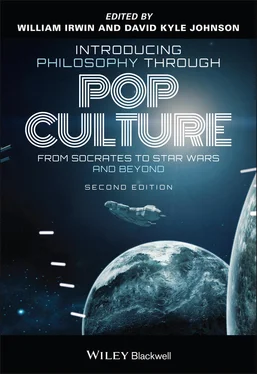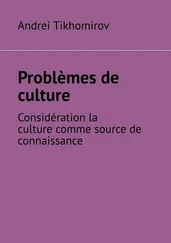38 Aline Maya, “Black Mirror and #DeathTo: What are the Consequences of Trial by Twitter?” from David Kyle Johnson (ed.) Black Mirror and Philosophy: Dark Reflections (Hoboken: Wiley‐Blackwell, 2020), pp. 128–140. Reprinted by permission of John Wiley & Sons, Inc.
39 Steve Bein, “The Brick, the Plate, and the Uncarved Block: LEGO as an Expression of the Dao,” from Roy T. Cook and Sondra Bacharach (eds.), Lego and Philosophy: Constructing Reality Brick By Brick (Hoboken: Wiley‐Blackwell, 2017), pp. 175–184. Reprinted by permission of John Wiley & Sons, Inc.
40 David Kahn, “LEGO, Impermanence, and Buddhism,” from Roy T. Cook and Sondra Bacharach (eds.), Lego and Philosophy: Constructing Reality Brick By Brick (Hoboken: Wiley‐Blackwell, 2017), pp. 185–195. Reprinted by permission of John Wiley & Sons, Inc.
41 Steve Bein, “Zen and the Art of Imagineering: Disney's Escapism Versus Buddhism's Liberation,” from Richard B. Davis (ed.) Disney and Philosophy: Truth, Trust, and a Little Bit of Pixie Dust (Hoboken: Wiley‐Blackwell, 2020), pp. 25–34. Reprinted by permission of John Wiley & Sons, Inc.
42 Jonathan L. Walls and Jerry L. Walls, “Beyond Godric's Hollow: Life after Death and the Search for Meaning (Harry Potter),” from Gregory Bassham (ed.) The Ultimate Harry Potter and Philosophy: Hogwarts for Muggles (Hoboken: Wiley, 2010), pp. 246–257. Reprinted by permission of John Wiley & Sons, Inc.
43 David Kyle Johnson, “Why It Wouldn't Be Rational to Believe You're in The Good Place (and Why You Wouldn't Want to Be Anyway),” from Kimberly S. Engels (ed.) The Good Place and Philosophy Everything Is Forking Fine (Hoboken: Wiley, 2021), pp. 270–282. Reprinted by permission of John Wiley & Sons, Inc.
Philosophy has a public relations problem. Just the sound of the word “philosophy” scares a lot of people, conjuring images of long‐dead Greeks and crusty old professors. But the stereotypes of philosophy are just that – stereotypes. They are mistaken exaggerations and overgeneralizations. Some philosophy professors may be egg‐headed, ivory‐tower intellectuals, but most are not. In fact, many philosophy professors like the same things you like: television, movies, music, and video games. We see connections between these elements of pop culture and philosophy. So this book, written by philosophy professors, takes you from pop culture to philosophy; we wade into the water before swimming out deep. Each chapter in this new edition focuses on a piece of pop culture, like Harry Potter , Star Wars , or Wonder Woman , and teaches you about a particular issue in philosophy. We think you'll agree that, to paraphrase a classic Disney truism, a spoonful of pop culture helps the philosophy go down.
The idea of using examples to facilitate learning is not new to philosophy. Famously, Plato (428–348 BCE) used the story of the ring of Gyges, and Descartes (1596–1650) imagined a deceitful demon. However, most examples in philosophy are rather dry – finding people with bland names like Jones and Brown in difficult to describe circumstances, such as those in which we are potentially justified in believing that “Jones owns a Ford, or Brown is in Barcelona.” Thankfully, Hollywood writers do a much better job of creating engaging, imaginative scenarios than philosophers do. So why not use their creations to add spice to philosophy? As you'll discover in this book, The Matrix provides a vivid way of picturing Descartes's concerns about deception and knowledge, and South Park hilariously dramatizes the problem of evil by asking why good things (like inheriting a million dollars) happen to bad people (like Cartman). Indeed, many other insightful philosophical illustrations from pop culture await your reading.
Now, of course, you may be concerned that you're in trouble because in addition to being clueless about philosophy you're also clueless about The Matrix and South Park . There's no need to worry. You don't have to be an expert on Marvel movies or to have seen every episode of The Good Place to benefit from this book. Even a passing acquaintance with the pop culture icon discussed in any given chapter will be enough for you to learn the philosophy to which it is connected. You can get that easily enough on the internet. In fact, you can visit the website for this book at https://introducingphilosophythroughpopculture.comfor all kinds of helpful up‐to‐date links.
In sum, this book is intended to make initial connections between pop culture and philosophy that will pique your interest in the latter and lead you to study and appreciate the subject more deeply. Maybe you'll even decide to tell your friends that philosophy has gotten a bad rap. Certainly, we believe you'll find that philosophy is relevant, fun, and exciting. 1
1 1For pop culture resources and philosophical resources related to all chapters please visit the website for this book: https://introducingphilosophythroughpopculture.com.
Part I
What is Philosophy?
Introduction
The word “philosophy” is often confused with the words “opinion,” “theory,” or “approach”–as in, “What is your philosophy of life?” or “Our philosophy is never to be undersold!” As a result, some students have mistaken ideas about what a philosophy class is. “Can you even give a wrong answer in a philosophy class? Isn’t it just whatever you think?” Well, yes you can, and no it’s not.
The word “philosophy” comes from the Greek language and means “love of wisdom.” Philosophers seek truth and wisdom above all else. The questions for which true answers are most important, but most elusive, form the core of philosophy. What is the nature of reality? What is knowledge, and how can one attain it? Is there a God? What is the nature of good and evil? How can I live a good life? How should we govern ourselves? What is the meaning of life? So how do philosophers seek answers to these questions? Are there really answers? Or is whatever anyone thinks just “true for them” because they have a “right to their opinion?” What role does philosophy play in society? And what attitude does philosophy require?
In Chapter 1, William Young argues that philosophy and the TV show South Park share some common aims. Like the philosopher Socrates (469‐399 BCE), South Park is charged with corrupting the youth, inappropriately challenging moral norms, and being a social nuisance. But the accusations are unfounded for both Socrates and South Park . The accusers are actually the corruptors; for example, parents corrupt the youth when they leave their kids to be raised by television without educating them about what they are seeing. Thankfully South Park , like Socrates, teaches us to draw our own conclusions–not merely accept the consensus of the crowd–and to reach those conclusions by considering the perspectives of others. Clearly, Young argues, South Park is not mindless and harmful; the show, like philosophy, is a gadfly, “an annoying pest that goes around ‘stinging people’ with…challenging questions and critical reflections so as to keep them intellectually awake and on their toes.”
Philosophers’ appetite for truth is insatiable, but they do not always agree. To solve their disputes they use logic. In Chapter 2, Robert Arp takes examples from South Park to teach some of the basics of logic including the structure of arguments, the differences between good and bad arguments, and the distinction between inductive and deductive arguments. The lesson concludes with common logical fallacies, illustrated by South Park for comedic effect. In one classic episode, for example, the cartoon version of Johnnie Cochran commits the red‐herring fallacy by suggesting that Chef must not have written the Alanis Morissette song “Stinky Britches” because Chewbacca spent most of his time on Endor: “If Chewbacca lives on Endor, you must acquit.”
Читать дальше












